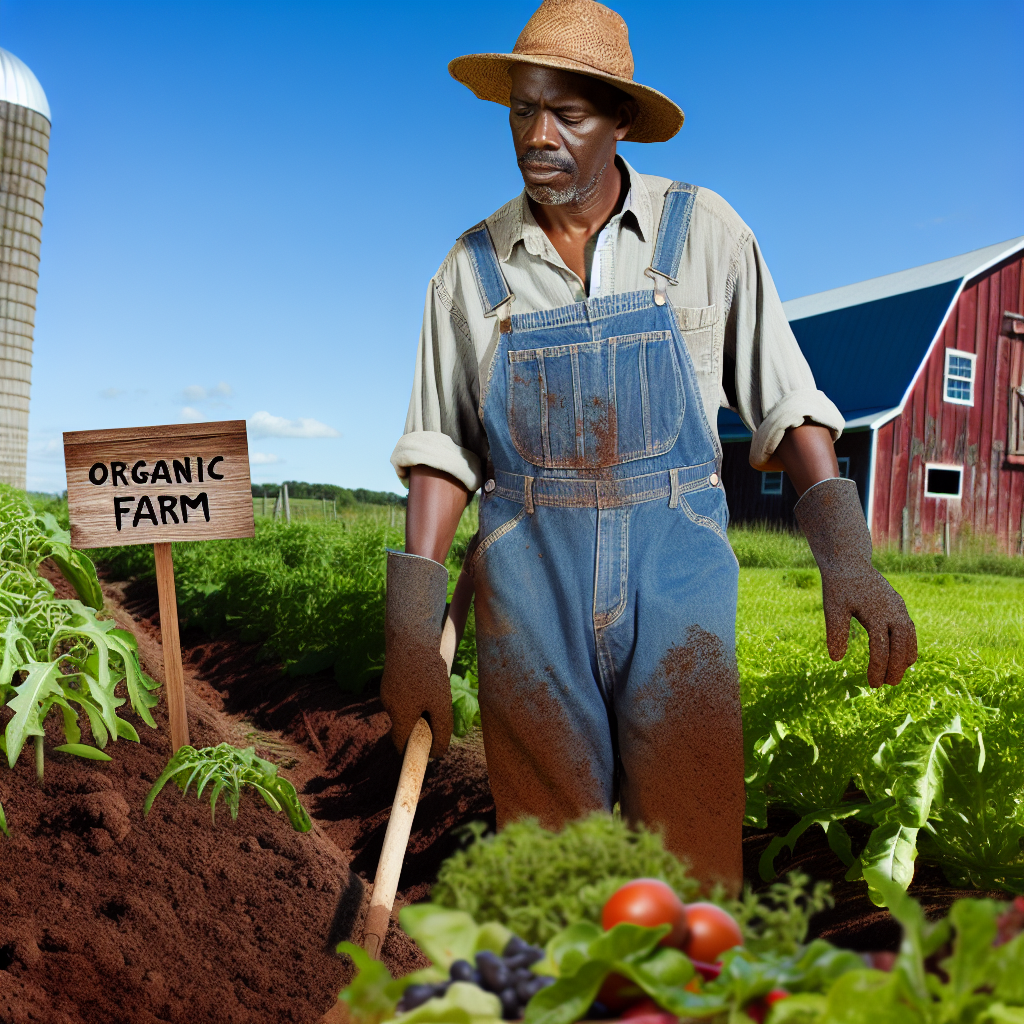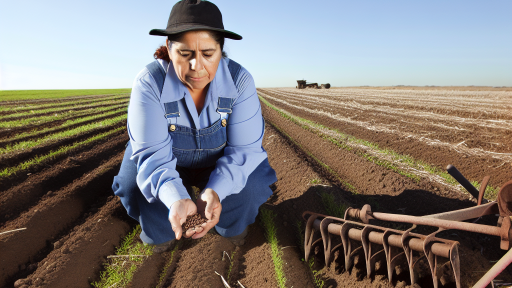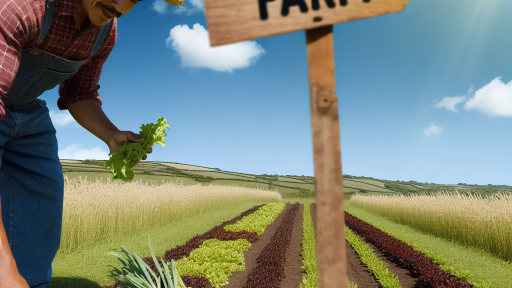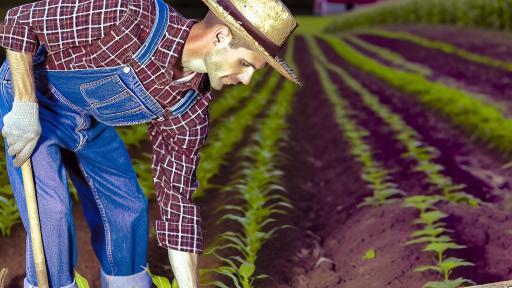Introduction to Organic Farming and Its Principles
Organic farming emphasizes a holistic approach to agriculture.
This method prioritizes environmental health and sustainability.
Farmers focus on nurturing the soil rather than depleting it.
Therefore, organic farming avoids synthetic fertilizers and pesticides.
Additionally, it promotes biodiversity on farms.
Crop rotation and cover cropping are common practices.
These techniques help maintain soil health and reduce pests.
Organic farming also enhances the quality of food produced.
Consumers benefit from fresher and healthier options.
Consequently, there is a growing demand for organic products.
Farmers often find a premium market for their goods.
Moreover, organic practices contribute to climate resilience.
These methods can sequester carbon in the soil.
As a result, organic farming plays a role in climate change mitigation.
Community involvement is another principle of organic farming.
Transform Your Agribusiness
Unlock your farm's potential with expert advice tailored to your needs. Get actionable steps that drive real results.
Get StartedFarmers often engage with local consumers through farmers’ markets.
This connection fosters a sense of community and transparency.
Organic farming is built on principles that benefit both people and the planet.
Comparison of Organic and Conventional Farming Practices
Defining Organic Farming
Organic farming emphasizes sustainable practices and ecological balance.
It avoids synthetic pesticides and fertilizers.
Organic techniques often enhance biodiversity and soil health.
Defining Conventional Farming
Conventional farming relies on chemical inputs to maximize crop yields.
Farmers use synthetic fertilizers to promote rapid growth.
This approach focuses on short-term production over long-term sustainability.
Soil Management Practices
Organic farming enriches soil through compost and green manures.
This method increases soil fertility naturally.
In contrast, conventional farming often depletes soil quality over time.
Pest Management Techniques
Organic farmers use natural predators to manage pests effectively.
This method minimizes chemical exposure to consumers and the environment.
Conversely, conventional farming uses pesticides to eliminate pests quickly.
Impact on Biodiversity
Organic farming promotes diverse ecosystems on farms.
It supports beneficial insects and pollinators, enhancing crop yields.
On the other hand, conventional practices can harm biodiversity.
Environmental Considerations
Organic farming contributes positively to environmental health.
It reduces pollution through decreased chemical runoff.
Meanwhile, conventional farming practices can lead to soil and water contamination.
Health Implications for Consumers
Organic produce typically contains fewer pesticide residues.
This increases its appeal to health-conscious consumers.
In contrast, some critics point out that conventional farming can compromise food safety.
Showcase Your Farming Business
Publish your professional farming services profile on our blog for a one-time fee of $200 and reach a dedicated audience of farmers and agribusiness owners.
Publish Your ProfileEconomic Factors
Organic farming often requires higher labor inputs and management skills.
However, it frequently fetches premium prices in the market.
Conventional farming generally results in lower initial costs and quicker returns.
Consumer Awareness and Preferences
Rising consumer awareness drives demand for organic products.
Many people perceive organic foods as healthier and more sustainable.
This trend challenges conventional farming to adapt to modern consumer preferences.
Environmental Benefits: Soil Health and Biodiversity
Enhancing Soil Health
Organic farming significantly improves soil health.
This method enhances soil structure and fertility.
It increases the presence of beneficial microorganisms.
These microorganisms contribute to nutrient cycling.
As a result, plants receive essential nutrients more efficiently.
Organic practices, such as crop rotation, further enhance soil quality.
This rotation prevents soil nutrient depletion.
Moreover, organic farming uses compost and cover crops.
These practices enrich the soil with organic matter.
Healthy soil promotes robust plant growth and resilience.
Promoting Biodiversity
Organic farming fosters diverse ecosystems.
Diverse habitats support various species, including pollinators.
Pollinators play vital roles in crop production.
Additionally, organic farms often include hedgerows and wild areas.
These features provide shelter for wildlife.
Consequently, pest populations remain naturally regulated.
Organic methods also reduce chemical runoff into waterways.
This practice protects aquatic ecosystems and drinking water sources.
Thus, organic farming supports both terrestrial and aquatic life.
Mitigating Climate Change
Organic farming contributes to climate change mitigation.
This approach sequesters carbon in the soil.
Practices like reduced tillage help maintain soil carbon stores.
Additionally, organic farming relies on local resources.
This reduces transportation emissions and supports local economies.
Thus, when practiced widely, these strategies can reduce overall carbon footprints.
Moreover, resilient ecosystems better withstand climate variations.
The enhanced agricultural biodiversity aids in adaptation efforts.
Overall, organic farming represents a sustainable solution to environmental challenges.
Uncover the Details: Cover Crops for Enhancing Organic Soil Health
Reduction of Chemical Inputs and Its Impact on Ecosystems
Benefits of Reducing Chemicals
Organic farming significantly reduces the use of synthetic chemicals in agriculture.
This reduction leads to healthier ecosystems that thrive without harmful pesticides.
Moreover, it promotes the natural resilience of plants and soil organisms.
Additionally, using fewer chemicals safeguards water quality in nearby streams and rivers.
Reducing chemical inputs allows for increased biodiversity in farming environments.
Showcase Your Farming Business
Publish your professional farming services profile on our blog for a one-time fee of $200 and reach a dedicated audience of farmers and agribusiness owners.
Publish Your ProfileImpact on Soil Health
Healthy soil is essential for sustainable agriculture.
Organic practices enhance soil structure and fertility over time.
Reduced chemical use strengthens soil microbial communities.
These communities contribute to nutrient cycling and organic matter formation.
As a result, farmers experience improved crop yields and quality.
Effects on Wildlife
Minimizing chemical inputs positively influences local wildlife populations.
Beneficial insects, such as pollinators, thrive in less toxic environments.
Birds and other wildlife benefit from diverse habitats that organic farming promotes.
Consequently, organic farming supports ecosystem stability and health.
Long-Term Sustainability
Organic farming practices encourage sustainable resource use.
By relying on natural processes, farms can maintain productivity without depleting resources.
This approach ensures food security for future generations.
Additionally, it reduces the risk of chemical resistance among pests and diseases.
Overall, this leads to a more resilient agricultural system.
Gain More Insights: Managing Organic Farms with Precision Agriculture
Economic Advantages
Market Demand
Organic farming significantly boosts market demand for sustainable products.
Consumers increasingly prefer organic options due to health and environmental concerns.
This trend creates a fruitful opportunity for farmers embracing organic practices.
Consequently, organic products often sell faster than their conventional counterparts.
Additionally, the demand for organic foods continues to grow year on year.
Price Premiums
Organic products typically command higher price premiums in the market.
For instance, organic vegetables and fruits can sell at substantially higher prices.
This fully compensates farmers for their increased cultivation efforts.
Moreover, many consumers are willing to pay extra for premium quality.
This trend enhances farmers’ income and sustains their livelihoods.
Access to New Markets
Organic farming opens doors to diverse market opportunities.
Farmers can access specialty stores, farmers’ markets, and online platforms.
These channels allow them to reach health-conscious consumers directly.
Additionally, organic certification enhances visibility and credibility in the market.
This boost in market presence significantly contributes to farm profitability.
Long-Term Business Stability
Engaging in organic farming fosters long-term economic sustainability.
As the organic market expands, farms benefit from consistent customer loyalty.
This loyalty leads to repeat purchases, securing farmers’ sales over time.
Furthermore, organic practices can help mitigate risks associated with market volatility.
This ultimately fosters a more stable and predictable income stream.
Explore Further: Organic Crop Planning for Year-Round Success
Health Benefits for Consumers
Nutritional Value
Organic farming produces food with higher nutritional value.
Studies show that organic fruits and vegetables often contain more vitamins.
They also have higher levels of antioxidants, which are beneficial for health.
Additionally, organic meat and dairy possess more omega-3 fatty acids.
Showcase Your Farming Business
Publish your professional farming services profile on our blog for a one-time fee of $200 and reach a dedicated audience of farmers and agribusiness owners.
Publish Your ProfileThis quality results from the animals’ natural diets and raised conditions.
Consequently, choosing organic options can lead to better overall health.
Food Safety
Organic farming practices prioritize food safety for consumers.
Organic foods are less likely to contain harmful pesticide residues.
This method limits the use of synthetic fertilizers and chemicals.
As a result, organic products often present fewer health risks.
Moreover, the strict regulations in organic certification bolster safety standards.
Consumers can trust that organic products meet high safety criteria.
Environmental Impact
Organic farming protects the environment, benefiting consumers indirectly.
This approach promotes healthier soil and reduces water pollution.
Additionally, it encourages biodiversity, leading to a balanced ecosystem.
Healthy ecosystems contribute to the production of safe food.
In supporting organic methods, consumers also support environmental sustainability.
Enhanced Flavor
Many consumers report that organic food tastes better than conventional options.
This improvement in flavor results from the natural growing methods used.
Organic produce is often fresher and harvested at its peak ripeness.
Consequently, this leads to a more enjoyable eating experience.
Consumers can appreciate the distinct flavors that organic farming delivers.
Learn More: Soil Health 101: Techniques to Boost Crop Growth Naturally

Social and Community Impact
Supporting Local Economies
Organic farming significantly boosts local economies.
It encourages consumers to buy from nearby farms.
This purchasing behavior creates jobs within the community.
Local farmers sustain their livelihoods by selling directly to consumers.
Moreover, local markets thrive when they feature organic products.
Such markets foster community ties through shared agricultural practices.
Promoting Community Well-Being
Organic farms often contribute to overall community health.
They provide fresh, chemical-free produce to families.
Access to healthy food improves nutrition amongst residents.
Additionally, these farms can promote educational programs.
Workshops on sustainable practices engage community members.
Families learn to appreciate the benefits of organic food.
Strengthening Environmental Awareness
Engaging with organic farming can increase environmental education.
Communities become more aware of ecological issues.
Local farms can serve as educational resources for schools.
Field trips to these farms create memorable learning experiences.
Students learn about biodiversity and sustainable practices.
Such initiatives foster a culture of environmental stewardship.
Building Social Connections
Organic farming creates opportunities for social interactions.
Community events often center around harvests and markets.
These gatherings strengthen neighborhood relationships.
Showcase Your Farming Business
Publish your professional farming services profile on our blog for a one-time fee of $200 and reach a dedicated audience of farmers and agribusiness owners.
Publish Your ProfilePeople from different backgrounds can come together through shared interests.
Collaborative projects encourage teamwork and friendship.
Overall, this promotes a sense of belonging in the community.
Challenges and Solutions in Implementing Organic Farming
Understanding Common Challenges
Organic farming faces several significant challenges today.
Limited access to organic seeds presents a major hurdle.
Additionally, pest management can be more difficult without synthetic chemicals.
Farmers also struggle with maintaining soil fertility over time.
Furthermore, market access remains an ongoing concern for many producers.
Addressing Limited Access to Resources
Farmers can explore cooperative purchasing to improve seed access.
Community seed banks can also help mitigate this issue.
Developing relationships with local suppliers encourages mutually beneficial outcomes.
Additionally, online platforms provide broader access to organic resources.
Innovating Pest Management Techniques
Farmers can adopt integrated pest management strategies effectively.
These strategies combine biological, cultural, and physical methods.
Utilizing beneficial insects aids in natural pest control.
Crop rotation further enhances pest management by disrupting their life cycles.
Enhancing Soil Fertility
Practices like cover cropping improve soil health sustainably.
Composting enriches the soil and recycles organic matter efficiently.
Organic fertilizers, such as manure and green manure, boost fertility adequately.
Conducting regular soil tests helps in understanding specific nutrient needs.
Improving Market Access
Farmers can join organic certification programs to enhance marketability.
Direct-to-consumer sales, such as farmers’ markets, create new revenue opportunities.
Networking with local restaurants can foster beneficial partnerships.
Online marketing platforms offer additional channels for reaching consumers.
Investing in Education and Training
Continuing education for farmers ensures they remain informed and successful.
Workshops on organic farming best practices are widely beneficial.
Mentorship programs connect experienced organic farmers with newcomers.
Online resources and communities provide ongoing support and knowledge sharing.
Future Prospects: Scaling Organic Practices for Global Sustainability
Expanding Organic Agriculture
Organic agriculture is gaining traction worldwide.
Farmers increasingly adopt organic methods to improve sustainability.
This growth leads to healthier ecosystems and soils.
Moreover, organic practices enhance biodiversity on farms.
Ultimately, adopting organic methods globally can transform agriculture.
Innovative Technologies in Organic Farming
Advancements in technology support organic farming growth.
Innovative tools improve efficiency in organic practices.
For example, precision agriculture helps optimize resource use.
Additionally, drones assist in monitoring crop health.
These technologies make organic farming more viable for all farmers.
Collaboration Among Stakeholders
Collaboration is essential for scaling organic farming.
Governments, NGOs, and private sectors must work together.
Showcase Your Farming Business
Publish your professional farming services profile on our blog for a one-time fee of $200 and reach a dedicated audience of farmers and agribusiness owners.
Publish Your ProfileShared knowledge can improve organic practices across the globe.
This teamwork fosters community-supported agriculture initiatives.
Consequently, farmers gain access to resources and training.
Consumer Trends and Support
Consumer interest in organic products is on the rise.
This trend drives demand for sustainably grown food.
Consumers advocate for organic labels and certification systems.
Moreover, they support local farmers through direct purchases.
Such support encourages more farmers to transition to organic methods.
Policy Changes and Incentives
Government policies can significantly impact organic farming.
Incentives can help farmers transition to organic practices.
For instance, tax breaks for organic producers encourage adoption.
Additionally, funding for research can spur innovation in sustainable agriculture.
These initiatives create a favorable environment for organic farming growth.
Additional Resources
Sustainable Agriculture Programs | NIFA
Cover Cropping to Improve Climate Resilience | USDA Climate Hubs




